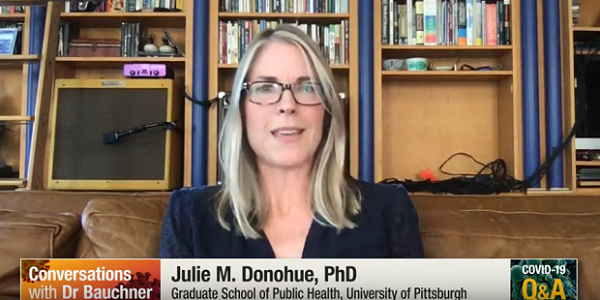
School Closures in the Spring Saved Lives, Study Asserts
But, experts caution, the findings highlight a period when few precautions were in place, and do not apply to current discussions about reopening schools.
NEW YORK TIMES - In a new analysis, pediatric researchers have estimated that the states' decisions to close schools last spring likely saved tens of thousands of lives from Covid-19 and prevented many more coronavirus infections. The findings come amid a worldwide debate on whether, when, and how to reopen schools, including for some 56 million American students, kindergarten through high school.
The paper, published Wednesday in JAMA, is likely to remind school districts and policymakers how consequential their decisions could be for the shape of the pandemic this fall. The study focused on a six-week period in the spring and concluded that school closure "may have been associated with approximately 1.37 million fewer cases of Covid-19 over a 26-day period and 40,600 fewer deaths over a 16-day period."
Experts noted that the impact of preventive measures taken by states — including stay-at-home orders, closures of restaurants, and nonessential businesses and limits on large social gatherings — simultaneously or shortly after school closings, made it hard to determine the specific role of schools in such analyses.
"I think we have to be incredibly cautious when interpreting estimates from a study like this," said Julie Donohue of the Department of Health Policy and Management at the University of Pittsburgh, who co-wrote an editorial about the study. "In particular, I think it's important to emphasize that we really can't isolate the impact of school closures from other interventions."
 Dr. Donohue added that "even if these numbers were accurate or valid, we don't know how much of the effect would be derived from reducing contacts among kids at school, versus reducing contacts among parents who have to stay home from work because their children are out of school."
Dr. Donohue added that "even if these numbers were accurate or valid, we don't know how much of the effect would be derived from reducing contacts among kids at school, versus reducing contacts among parents who have to stay home from work because their children are out of school."
Given that the study is being published just as districts around the country are struggling with whether and how to reopen schools, some experts expressed concern that its estimates about the impact of closing schools early in the pandemic would be seized upon as an argument that schools should remain closed. Experts on public health and education have recommended that communities and schools should work toward reopening with strong health precautions in place because in-person schooling has such tremendous value for children's academic, social, and emotional development.
"I do worry that these large estimates of the effect of school closures will lead people to give up because it is going to be challenging to open schools," Dr. Donohue said. "I do worry that some districts will look at these numbers and say, well, it's just too hard, and it's not safe to reopen."
Read full story in the New York Times, "School Closures in the Spring Saved Lives, Study Asserts."
Watch JAMA interview in the Conversations with Dr. Bauchner podcast JAMA's editor-in-chief discusses the study's implications for school reopening with Pitt's Julie Donohue and with study author Katherine Auger. Each week, Dr. Howard Bauchner interviews leading researchers and thinkers in health care about their recent JAMA articles, going beyond an article recap to delve into the background, context, and implications of the study.
7/29/2020